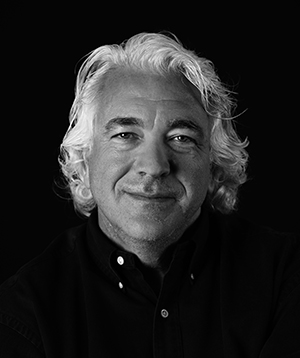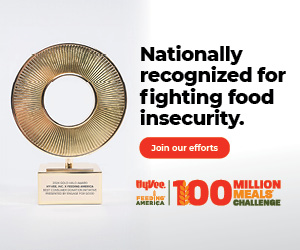 By Bill Stowe, as told to Christine Riccelli
By Bill Stowe, as told to Christine Riccelli
Bill Stowe has been the CEO and general manager of Des Moines Water Works since 2012, following another high-profile position as an assistant city manager for Des Moines’ public works and engineering departments. Last year, Water Works sued three upstream counties for discharging agricultural pollutants into the state’s waterways. In a conversation condensed by dsm editor Christine Riccelli, the 57-year-old Stowe reflects on the controversial lawsuit—as well as on the inspiration he draws from studying Catholic mystics, riding a Harley and taking care of his 97-year-old mother.
Just Do It
I grew up in Nevada, Iowa. It was Norman Rockwell’s America—a very safe, beautiful, homogeneous community. I loved it. But that’s not the world we live in today. I don’t think Nevada could be described in these kind of mythical terms any longer.
In a very formative period of my life, I lost several folks important to me. My brother, Bob, was killed in a construction accident when I was in junior high. He was 12 years older than me. To some degree, his death still hurts. My grandfather, who lived with us, died of cancer. And my best friend in high school became a serious substance abuser and committed suicide.
All this colored my view of the world. Probably more than anything, my brother’s death got me interested in safety, health, and environmental and labor issues, and set me down the path that I’ve stayed on since.
When you’re young and you lose people who are so important to you in a relatively short period of time, it impresses upon you that if you’re going do anything substantive in the limited amount of time you have, you’d better just do it—and not assume that you’re going do it when you’re 70 or 60 or 50 or even 40. It also helps you realize the importance of faith—the ability to understand that some things are not readily understandable.
Stand up for accountability
I graduated from Grinnell College in 1981 with a degree in economics … and then I went to graduate school at the University of Illinois in labor economics and industrial relations. From there, I was hired by Inland Steel in Chicago, which then was one of the largest manufacturing facilities in the world. I was primarily a lead management representative in labor issues. It was very interesting work and a great experience. I was a small-town kid from Nevada who suddenly found himself living in a big-city world where getting to your office can take two hours because of traffic and working at a monstrous industrial plant.
For a couple of years, I had an assignment to work in southern Illinois in the company’s coal business. The area was very much Appalachian country. I had a northern accent and I was from the Chicago offices and I was a Catholic, and that was all very different from the coal miners. Sometimes I would be grocery shopping and someone would ask me to read a label for them because they literally couldn’t read. They maybe could see the picture on the can, but they would want to make sure it was what they wanted. You pull a number of things out of that kind of experience—first and foremost, the importance of education.
There are a lot of environmental issues associated with producing steel or digging coal out of the ground. These industries walked into economic oblivion and became an anachronism for different reasons, but they did recognize their environmental impact and responsibilities. They were accountable for what they did to the environment and the people they affected.
This is the major problem that we’ve raised about industrial agriculture in our state: It gets a free pass on environmental accountability. No business can operate in the state and put things into the environment, including the waters of Iowa, and not be held accountable—except for agriculture. Agricultural accountability for environmental impact is the focus the Board of Water Works Trustees has set.
We’re not talking about ag runoff. We’re talking about piping systems beneath all those fields that move polluted waters at levels that are unsafe for our community into the state’s surface waters—which we then have to clean up. Political leaders tell us residents downstream, “Hey, tough. You deal with it as you must. We’re not accountable for that.” That’s not acceptable to us and to our customers. Hence, we brought a lawsuit—a lawsuit that really is about agricultural accountability.
Focus on the greater good
In 1986, Stowe moved to New Orleans to work in labor relations for Royal Dutch Shell Oil. While there, he earned a law degree at Loyola University. He also has a master’s degree in engineering from the University of Wisconsin in Madison.
I had a great experience in New Orleans, but I was ready to come back. Around 1992, I joined what was then Iowa Power doing labor and human resource stuff, but then ended up in charge of operations in Johnson County, Iowa City, and surrounding areas. My dad became critically ill … and I came back to Des Moines. I was hired to head the human resource function with the city of Des Moines, and after a few years there, I expressed my interest in operations. So I moved on to the public works department, where I stayed for 15 years.
I came to this job at Des Moines Water Works thinking that water quantity would be the issue—managing droughts and floods. But within six months, I knew it was a water quality issue.
The Des Moines and Raccoon rivers are so degraded that we had to do something. Public health and safety are critical in my public service. Our customers and the future of our state really are at risk.
We’re an agricultural state that has forgotten that the agricultural and environmental sectors can work together. But agriculture isn’t necessarily pro-environment. We sell ourselves this mantra that we feed the world. Well, we don’t feed the world. We don’t even feed ourselves. We feed our gas tanks with ethanol and we feed hogs that get sent to China. We’ve got this industrial model of corn-growing and animal-feeding operations that’s not the farm world that I knew growing up as a small-town Iowan. Its environmental footprint has really changed. And we’re seeing the consequences of that—eight times more hogs than people, and rivers and air polluted by agrotoxins.
None of us own the water that flows through our farms or through our water plant. We all own it. It is something that connects us. I think we Iowans see ourselves as community-committed and generous and honest. But when it comes down to this commodity called water, we fill it full of pollutants and push it downstream and pretend we’re not accountable for it.
The first and most important thing Water Works is doing is protecting the interest of our consumers both economically and in terms of public health. Our customers are having to pay to clean up the water that’s a cost of corn and livestock production that relies on pushing waste downstream.
That has to stop. Industrial agriculture can’t continue to follow a nonsustainable course. For a hundred years, we’ve held the view that producing more and polluting more were acceptable. Some of us are no longer willing to accept that.
There are social justice issues here as well. I would be remiss if I didn’t mention the Holy Father’s encyclical on the environment: It’s very clear about the importance of protecting our environment from those who disregard it because the poor ultimately suffer the consequences.
To whom much is given, much is expected … and those of us who are able to live beyond the idea that life consists of work-eat-sleep-repeat can’t abuse the gift we’ve been given by disregarding our responsibility to contribute to the greater good.
Practice discernment
We’re pushing against the grain with our lawsuit. So there is almost an incomprehensible beast that’s constantly coming at us from the political side. It does not feel good to make enemies in both political parties and with the political leadership of Iowa. When you turn on the TV and see a negative, dark-money ad about you or know that people have hired private investigators to investigate you or hear the governor of the state talk about how you’ve declared war on rural Iowa, you realize that you’re in the midst of something that’s not only serious but important, and it’s bigger than any single person.
I’ve lost friends and significant people I’m close to because the lawsuit is very controversial. But as a Jesuit-educated Roman Catholic, I believe that the Catholic mystics—St. Teresa of Avila, St. John of the Cross, St. Ignatius of Loyola—teach us how to develop a strength of self and to understand that our mission is greater than our personal comfort, greater than our friendships, greater than the adversity. Transformation is painful and liberating.
At the end of the day, you ask: Are you doing the right thing? Is what you’re doing part of a larger cause? Are you fulfilling the obligation you have to others? You go through a process of discernment.
Read and ride
I’m an avid reader. I’m reading a great book right now called “The Immortal Irishman,” about Civil War general Thomas Meagher. He was a bizarre cat—an Irish immigrant who went on to be a general and the governor of Montana. … There are a lot of good books about historic figures that I think are very relevant for us in 2016—having strength through adversity.
And I’m an avid Harley-Davidson motorcycle rider. I ride whenever I can. It’s very relaxing to get on the motorcycle on a beautiful day, feel the sun on my face, ride to the rural area where I grew up and have a beer and talk with some folks.
Cultivate patience
(Editor’s note: Bill Stowe’s mother, Rhoda Smith Stowe, died as this issue was going to the printer.)
My mom has dementia. I visit her every day. Taking care of somebody who took care of you is an incredible experience. I’m not always a patient person, but patience is very important when it comes to this kind of thing.
The other day when I visited, I was in a short-sleeved shirt and she looked at me and said, in all seriousness, “That looks like a very heavy winter coat you have on.” I said, “Mom, I’m perfectly comfortable. Don’t worry about me.” Five years ago I certainly would have been annoyed and said, “This is not a winter coat, Mom; it’s a short-sleeved shirt.”
But there’s an obvious cognitive disconnect there, where she’s seeing something different and articulating it in a different way than you or I would. It takes patience to see that she was just trying to be protective of me even though the facts were completely off.
A few years ago, she almost died, but her do not resuscitate orders couldn’t be found so she was revived. At the time, I was disturbed by this. But now when she smiles at me and I see she isn’t afraid and is happy in her own way … I realize what a gift spending the last three years with her has been.



Show Comments (1)
Steve Pohlmeyer
In many ways, I view Bill Stowe as a hero. After reading this piece, I now appreciate him even more.
Comments are closed.